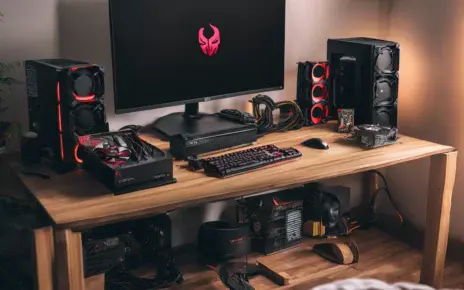Building a gaming community isn’t just about creating a place for players to gather—it’s about fostering an environment where people can connect, share experiences, and grow together. Whether you’re running a small gaming forum or managing a massive online platform, the key to success lies in the relationships you cultivate. To help you on this journey, we’ve gathered insights from community managers, industry veterans, and top gamers to provide a comprehensive guide on how to build and maintain a thriving gaming community.
Define Your Community’s Purpose
The first step in building a successful gaming community is defining its purpose. What makes your community unique? Are you focusing on a specific game, genre, or platform? Or perhaps you’re building a space for competitive gamers, casual players, or developers?
- Expert Insight: “Communities with a clear purpose are more likely to thrive. Define what your community is about from day one. This attracts the right members and sets the tone for future interactions.” — Sarah Thompson, Community Manager at Riot Games
- Action Tip: Create a mission statement for your community and communicate it clearly on your site or platform. For example, “Our community is a welcoming space for competitive Overwatch players looking to share strategies, find teammates, and improve their skills.”
Create Engaging Content
One of the best ways to keep your community active and engaged is by regularly posting interesting and relevant content. This can include game guides, news updates, discussions, live streams, or community events.
- Expert Insight: “Content is king in gaming communities. Whether you’re sharing developer updates, hosting live Q&As, or running in-game events, regular content gives your members a reason to return and participate.” — Alex Moreno, Content Strategist at IGN
- Action Tip: Schedule weekly or monthly content like game nights, tournaments, or “Ask Me Anything” (AMA) sessions. Collaborate with content creators to generate unique and interactive content for your members.
Foster a Positive and Inclusive Environment
Toxicity can quickly kill a gaming community. To build a lasting community, it’s essential to cultivate a positive, inclusive environment where everyone feels welcome, regardless of skill level or background.
- Expert Insight: “Create guidelines that reflect your community’s values. Be clear on what’s acceptable and what’s not, and enforce those rules consistently. A welcoming environment attracts long-term members.” — Ben Davis, Senior Moderator at Discord
- Action Tip: Develop a clear set of community guidelines that promote respect, inclusivity, and constructive interaction. Appoint moderators or admins to enforce these guidelines and step in when conflicts arise.
Encourage Participation and Ownership
For your community to truly thrive, members need to feel like they have a voice and a stake in its success. Empower your members by encouraging them to contribute ideas, organize events, and take on leadership roles within the community.
- Expert Insight: “Communities are strongest when members feel a sense of ownership. Allow them to suggest new initiatives or even lead projects. It fosters investment and commitment.” — Emily Walsh, Community Lead at Ubisoft
- Action Tip: Start a community suggestion board where members can propose new events, challenges, or features. Promote community-run initiatives like fan art contests, member spotlights, or fan-made game guides.
Stay Consistent and Active
Community management is a long-term commitment. Building a successful gaming community takes time, consistency, and active involvement from the leadership team.
- Expert Insight: “Successful communities don’t happen overnight. Regular check-ins, consistent engagement, and showing that you care will keep your community active. Inactive admins lead to inactive communities.” — Michael Chen, Community Manager at Bungie
- Action Tip: Schedule regular check-ins with your community. Host Q&A sessions, post announcements, and update members on any changes or new features. Your presence will inspire ongoing engagement from your members.
Leverage Social Media and Cross-Platform Integration
In today’s digital landscape, it’s essential to expand your community’s presence across multiple platforms. By integrating social media and other platforms, you can increase your community’s visibility and attract new members.
- Expert Insight: “Your community shouldn’t exist in
a vacuum. Expand its reach by leveraging social media platforms, YouTube, Twitch, and even Reddit. Being active across multiple platforms helps draw in new members and keep your current ones engaged.” — Jessica Romero, Social Media Manager at Twitch
- Action Tip: Create dedicated social media accounts for your gaming community. Share highlights from community events, promote discussions, and engage with your audience across platforms. Use tools like Discord to integrate chatrooms, voice channels, and event notifications seamlessly into your community.
Host Regular Events and Challenges
Nothing brings a gaming community together like shared experiences. Hosting regular in-game events, tournaments, and challenges not only adds excitement but also fosters stronger connections among your members.
- Expert Insight: “Events are the glue that holds a community together. Whether it’s a small giveaway or a major tournament, these moments create lasting memories and give members something to look forward to.” — Chris Walker, Event Coordinator at Epic Games
- Action Tip: Plan a variety of events, such as community game nights, tournaments with prizes, or creative contests like fan art or video content creation. Use these events as an opportunity to promote collaboration and friendly competition within your community.
Provide Recognition and Rewards
Everyone loves to be recognized for their contributions, and acknowledging active members can boost morale and encourage continued participation.
- Expert Insight: “Rewarding your most active and helpful members fosters loyalty and motivates others to contribute. Recognition doesn’t always need to be monetary—simple shoutouts can go a long way.” — Laura Jones, Community Director at Blizzard Entertainment
- Action Tip: Implement a system of recognition, such as “Member of the Month,” badges for participation, or special roles for top contributors. You can also offer in-game rewards, exclusive content, or early access to special features as incentives for engagement.
Handle Conflicts Effectively
In any community, conflicts are inevitable. How you handle them will define the long-term success of your group. Effective conflict resolution fosters a more respectful and harmonious environment.
- Expert Insight: “Conflicts can quickly spiral out of control if left unchecked. Establish clear processes for resolving disputes and ensure everyone feels heard, but also be prepared to take decisive action when necessary.” — Daniel Carter, Conflict Resolution Specialist at Activision
- Action Tip: Equip your moderators with conflict resolution strategies and establish a clear reporting system. If a disagreement arises, address it transparently and fairly, ensuring both sides have the opportunity to express their views.
Evolve with Your Community
As your gaming community grows, its needs and dynamics will change. It’s crucial to remain flexible and adaptable, ensuring that your community evolves alongside its members.
- Expert Insight: “A successful community is one that can grow and adapt to the changing needs of its members. Don’t be afraid to pivot your approach if it means keeping your community engaged and happy.” — Julia Barnes, Senior Community Manager at Valve
- Action Tip: Regularly survey your members to gather feedback on what’s working and what isn’t. Use this information to make improvements and introduce new features that cater to your community’s evolving needs. Stay up to date on trends in gaming and community management to stay ahead of the curve.
Conclusion
Building a successful gaming community requires time, dedication, and the right approach. By fostering a positive environment, engaging your members with consistent content, and encouraging active participation, you’ll create a thriving space where gamers feel at home. Remember, a strong community is built on relationships and shared experiences, so focus on cultivating meaningful connections and offering value to your members. With these expert insights, you’re well on your way to developing a vibrant, supportive gaming community.
What strategies have worked for your community? Share your insights in the comments!




